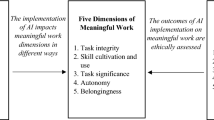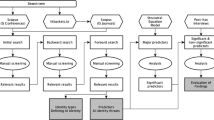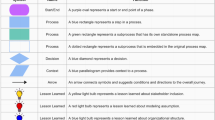Abstract
Most workers report that they are alienated from their jobs and find their workplaces to be stifling and uninviting. Given this condition, the introduction of computer technology, including AI, will only make matters worse, unless a more humane organizational culture is created. The key point in this article is the need to produce a responsible technology, so that employees are not further overworked and manipulated. To achieve this end, phenomenology is invoked, particularly the life world, to provide technology with a human foundation. In practice, this shift in philosophy means that when AI is introduced into an organization, workers have a central role in the design, implementation, and evaluation of this technology. Computer technology can thus promote human flourishing instead of control and alienation in workplaces.
Similar content being viewed by others
Notes
As written in the webpage of ‘chessbase.com' “The result of the final was a real shocker: ZackS defeated 14-year-old Russian GM Vladimir Dobrov, working together with a 2600 + colleague (and of course computers) convincingly with a 2.5:1.5 score. A full report on both sides will follow. For now we just note that ZackS consisted of a team of two players from New Hampshire: Steven Cramton, 1685 USCF and Zackary Stephen, 1398 USCF. They used three computers for the event, an AMD 3200 + , a 2.8 MHz and a 1.6 MHz Pentium. The ZackS team used the chess engines Fritz, Shredder, Junior and Chess Tiger—no GMs or IMs were involved.” Visit: https://en.chessbase.com/post/dark-horse-zacks-wins-freestyle-che-tournament.
For an electronic version, see https://hbr.org/2001/01/level-5-leadership-the-triumph-of-humility-and-fierce-resolve-2.
Situational Analysis is the core methodology of FlourishingAI.
This quote or very similar is connected to Eleonor Rosevelt, Buda Gautama, and St. Agustine.
Argyris appears in the Thinkers50 list. “Chris Argyris was one of the first thinkers installed in the Thinkers50 Hall of Fame”. Visit https://thinkers50.com/blog/chris-argyris-1923-2013-appreciation/.
Presentation done at Universidad Areandina, Bogota, Colombia, 2020.
References
Altman D (2007) Connected: 24 hours in the global economy. Farrar, Straus, and Giroux, New York
Argyris C (2010) Organizational traps. Leadership, culture, organizational design. Oxford University Press, Oxford
Beer S (1993) Designing freedom. Anansi Press, Toronto
Berger PL, Luckmann T (1966) The social construction of reality. Doubleday, Garden City
Blauner R (1964) Alienation and freedom. University of Chicago Press, Chicago
Bolter JD (1984) Turing’s man: western culture in the computer age. University of North Carolina Press, Chapel Hill
Brown B (2015) Daring greatly: how the courage to be vulnerable transforms the way we live, love, parent, and lead. Avery, New York
Buber M (1970) I and Thou. Charles Scribner’s Sons, New York
Charon R (2006) Narrative medicine: honoring the stories of illness. Oxford University Press, Oxford
Collins J (2001b) Level 5 leadership: the triumph of humility and fierce resolve. Harvard Business Review, Brighton
Collins J (2001) Good to great. HarperBusiness
Davenport TH, Brynjolfsson E, Mcafee AH, Wilson J (2019) Artificial intelligence. Harvard Business Review Press, Brighton
Dreyfus HL, Dreyfus SE (1986) Mind over machine. The Free Press, New York
Ellul J (1964) The technological society. Vintage Books, New York
Epstein DJ (2019) Range, Kindle. Penguin Publishing Group, New York
Fals-Borda O (1988) Knowledge and people’s power. New Horizons Press, New York
Frank AW (2010) Letting stories breathe. University of Chicago Press, Chicago
Fredrickson B (2009) Positivity. Crown Publishers, New York
Gadamer HG (1996) The enigma of health. Stanford University Press, Stanford
Gallup (2017) State of the global workplace. Gallup Press, Washington
Gergen K (1999) An invitation to social construction. Sage, Thousand Oakes
Hamel G, Breen B (2012) El Futuro de la Administración. Grupo Editorial Norma. HBS Press, Bogotá
Heidegger M (1969) Identity and difference. Harper & Row, New York
Heidegger M (1977) The question concerning technology and other essays. Harper and Row, New York
Herzberg F (1966) Work and the nature of man. The World Publishing Company, Cleveland
Kanter RM (1983) The change masters. Simon and Schuster, New York
Kanter RM (1992) The challenge of organizational change. The Free Press, New York
Kwet M (2018) “Break the Hold of Digital Colonialism”, Mail & Guardian. https://mg.co.za/article/2018-06-29-00-break-the-hold-of-digital-colonialism. Accessed 28 June 2021
Land KC (1983) Social indicators. Ann Rev Sociol 9:1–26
Landsberger HA (1958) Hawthorne revisited. Cornell University Press, Ithaca
Leung MW, Yen IH, Minkler M (2004) Community-based participatory research: a promising approach for epidemiology’s relevance to the 21st century. Int J Epidemiol 33:499–606
Levinas E (1969) Totality and infinity. Duquesne University Press, Pittsburgh
Levinas E (1998) Entre nous. Columbia University Press, New York
Lingis A (1994) The community of those who have nothing in common. University of Indiana Press, Bloomington
Livingstone J (2018) “The Profound Alienation of the Amazon Worker”. The New Republic, November27. newrepublic.com/article/152403/profound-alienation-amazon-worker. Accessed 11 Dec 2019
Mackey J, Sisodia R (2014) Conscious capitalism. Harvard University Review Press, Brighton
Marcuse H (1991) One-dimensional man, 2nd edn. Beacon Press, Boston
Marx K (1964) Economic and philosophic manuscripts. International Publishers, New York
Maslow A (1965) Eupsychian management. Irwin, Homewood
Maslow A (1968) Towards a psychology of being. Van Nostrand, Princeton
Mezirow J (1998) On critical reflection. Adult Educ Q 48:185–198
Mumford L (1963) Technics and civilization. Harcourt, Brace and World, New York
Papert S (1986) Mindstorms: children, computers, and powerful ideas. The Free Press, New York
Polkinghorne DE (1988) Narrative knowing and the human sciences. SUNY Press, Albany
Pollner M (1987) Mundane reason. Cambridge University Press, Cambridge
Pollner M (1991) Left of ethnomethodology: the rise and decline of radical reflexivity. Am Sociol Rev 56:370–380
Quinn RE, Thakor AV (2018) Creating a purpose-driven organization. Harvard Bus Rev 96(4):78-85
Rahman MA (1985) Theory and practice of participatory action research. In: Fals-Borda O (ed) The challenge of social change. Sage, Beverly-Hills, pp 107–132
Ritzer G (1993) The McDonaldization of society. Pine Forge Press, Newbury Park
Semler R (1994) Maverick. The success story behind the world’s most unusual workplace. Grand Central Publishing, New York
Sen A (1999) Development as freedom. Knopf, New York
Senge P, Ross R, Smith B, Roberts C, Kleiner A (1994) The fifth discipline fieldbook. Currency Doubleday, New York
Vicent J (2019) Amazon’s Latest Warehouse Machine Demonstrates the Slow Drip of Automation. The Verge, May 13. TheVerge.com/2019/5/13/18617465/Amazon-warehouse-workers-replaced-technology-jobs. Accessed 11 Dec 2019
Von Kimakowitz E, Pirson M, Spitzeck H, Dierksmeier C, Amann W (eds) (2011) Humanistic Management in Practice. Palgrave Macmillan, London
Von Kimakowitz E, Schirovsky H, Largacha-Martinez C, Dierksmeier C (eds) (2021) Humanistic management in practice, vol II. Palgrave Macmillan, London
Walker CR, Guest RH (1952) The man on the assembly line. Harvard University Press, Cambridge
Ware B (2019) Top five regrets of the dying: a life transformed by the dearly departing. Hay House Inc., Carlsbad
Weber M (1978) Economy and Society, 2 vols. University of California Press, Berkeley
Weick KE (1995) Sensemaking in organizations. Sage, Thousand Oaks
Zuboff S (1988) In the age of the smart machine. Basic Books, New York
Zuboff S (2019) The age of surveillance capitalism: the fight for a human future at the new frontier of power. Public Affairs, New York
Funding
Funding was provided by Fulbright-MinCiencias.
Author information
Authors and Affiliations
Corresponding author
Additional information
Publisher's Note
Springer Nature remains neutral with regard to jurisdictional claims in published maps and institutional affiliations.
Rights and permissions
About this article
Cite this article
Murphy, J.W., Largacha-Martínez, C. Is it possible to create a responsible AI technology to be used and understood within workplaces and unblocked CEOs’ mindsets?. AI & Soc 38, 2641–2652 (2023). https://doi.org/10.1007/s00146-021-01316-8
Received:
Accepted:
Published:
Issue Date:
DOI: https://doi.org/10.1007/s00146-021-01316-8




